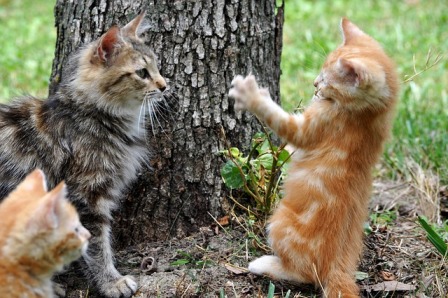How Do Cats Learn?
How Do Cats Learn?
When we see a young kitten exploring the outside world, we are usually astonished by the quickness they adopt toilet habits, recognise different sounds of opening the food containers, and the way they explore a new territory. They show the great learning capabilities that have not stopped with ending the kittenhood. After the early kittenhood and the phase when they mainly learn things from their mother, they begin learning from us. Every cat owner experienced the funny episodes of cats’ learning skills when they manage to open the door, drink from the water faucet, or open the fridge. But, how do cats really learn? Do they learn from imitating us like they watched their mother long ago? Or, do cats learn by trial and error? The article “How Do Cats Learn Things“ lists different ways in which cats learn.
How Do Cats Learn?
Cats are constantly learning new things even if their owners don’t realize it and the thing to bear in mind is that our feline friends are very fast learners indeed. All too often one single experience is enough, although repetition just reinforces what they have been taught (intentionally or not). Cats will naturally develop both a negative or a positive association with what they learn and they do so using pretty much the same principals which include the following:
• Habituation – this typically involves things found in their environment which are irrelevant to a cat
• Sensitisation – this generally is a process whereby a cat is repeatedly exposed to a situation or something which eventually leads to more of a reaction from the cat
• Classic conditioning – this involves reccurring situations and things found in an environment which leads to something else happening whether good or bad
• Operant conditioning – this happens continuously and involves a consequence to certain behaviours that then influence a following behavior
• Observational learning – this involves learning things from other cats which both kittens and adults routinely do
If we want to understand our cats better, we have to bear in mind that they are solitary animals, which lose fast motivational drive. Understanding this will help us to support our cat to abandon bad habits. They can be motivated to do something only if they know that reward is there. However, cats’ unwillingness to do something, even if their favorite food is the outcome puzzles us often. Many years in the wild taught cats importance of saving energy. If hunting becomes too complicated and takes more energy than the prey promises to provide in return, cats simply turn away and look for the easier prey. For them, avoiding unnecessary complications is a way to survive. To know how cats learn and motivate them are the great tools to cope better with the cat’s bad behavior when it happens.










